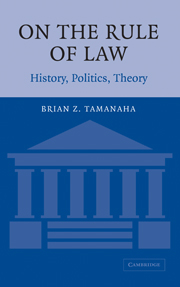Book contents
- Frontmatter
- Contents
- Acknowledgments
- Introduction
- 1 Classical origins
- 2 Medieval roots
- 3 Liberalism
- 4 Locke, Montesquieu, the Federalist Papers
- 5 Conservatives Warn
- 6 Radical left encourages decline
- 7 Formal theories
- 8 Substantive theories
- 9 Three themes
- 10 International level
- 11 A universal human good?
- Notes
- Bibliography
- Index
11 - A universal human good?
Published online by Cambridge University Press: 05 June 2012
- Frontmatter
- Contents
- Acknowledgments
- Introduction
- 1 Classical origins
- 2 Medieval roots
- 3 Liberalism
- 4 Locke, Montesquieu, the Federalist Papers
- 5 Conservatives Warn
- 6 Radical left encourages decline
- 7 Formal theories
- 8 Substantive theories
- 9 Three themes
- 10 International level
- 11 A universal human good?
- Notes
- Bibliography
- Index
Summary
At the outset of this book it was observed that politicians, government officials, political and legal theorists, business leaders, development experts, the World Bank and IMF, and many others around the globe, from liberal and non-liberal societies, from developed countries and developing countries, promote the rule of law as offering worldwide benefit. A quarter century ago noted Marxist historian E. P. Thompson incited a stormy academic debate among the far left when he declared, following a detailed historical study of liberalism in England, that the rule of law was an unqualified, universal good. Coming from one of their heroes, fellow Marxists considered this conclusion almost traitorous. Thompson confirmed that law served the interests of the ruling class, and that judges were drawn from the ruling class and showered it with favoritism. English liberal law, in the guise of neutrality, concealed and reinforced many iniquities. But that was not the whole story. He also discovered that the ideology of being bound by the law had a restraining effect on those with power, whether the monarchy or the wealthy. They claimed to be bound by the law, and the effect of this claim – because they and others around them came to believe and act upon this claim – was to place them within legal restraints. Rhetoric became reality. With this in mind, Thompson concluded that the rule of law was “a cultural achievement of universal significance.”
- Type
- Chapter
- Information
- On the Rule of LawHistory, Politics, Theory, pp. 137 - 141Publisher: Cambridge University PressPrint publication year: 2004
- 1
- Cited by



